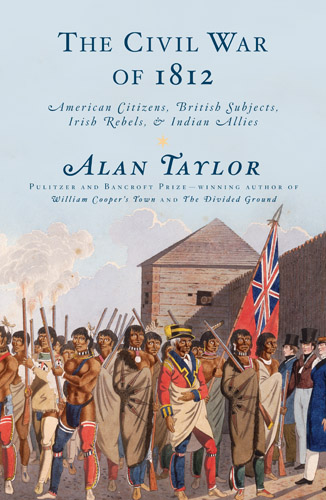
This article is from the Winter 2011 issue of MHQ. Visit the HistoryNet store to order your copy today!
The Civil War of 1812
American Citizens, British Subjects, Irish Rebels, and Indian Allies
By Alan Taylor. 656 pp. Alfred A. Knopf, 2010. $35
Reviewed by Thomas B. Allen
Images of the War of 1812 flash swiftly through American history: The rockets’ red glare. The White House in flames. Andrew Jackson victorious in New Orleans. Alan Taylor, turning away from those images, focuses on a theater of the war neglected by myths and icons. He explores the northern boundary that divided two kinds of Americans—the rebels who won the revolution and the loyalists who, having chosen the losing side, fled to Canada.
The battle of New Orleans “became celebrated in American story and song,” Taylor writes, when in fact most of the war “had been fought in the northern borderland, where Britons and their Indians had been more resourceful and victorious.”
The War of 1812 pitted the Democratic-Republicans, led by President James Madison, against the Federalists, who had held power under George Washington and John Adams. Congress authorized a 35,000-man army, but the war was so unpopular that only 18,500 enlisted. Federalist governors of Connecticut, Massachusetts, and Rhode Island refused to supply their militias. New England politicians talked of secession.
Taylor’s highly readable narrative navigates the long-neglected heartland of the war. And he shows how the “political struggle became entangled in the global and ideological war between France and Great Britain….The Republicans identified with France as a sister republic,” while the Federalists “denounced the French Revolution as dangerously radical and violent.” Another irritant to Britain was the surge in Irish immigration. Every Irish emigrant, Taylor writes, “reinforced American republicanism and deprived the British empire of valuable labor and a potential soldier or sailor.”
Historians usually cite as a cause of the war the British press gangs that snatched American sailors from their ships or dockside taverns and forced them to serve under the king’s flag. Taylor examines impressment in depth, pointing to the sea war between Britain and France as the pragmatic reason that the Royal Navy needed crewmen. And America’s naturalization law clashed with Britain’s belief that “no one born a subject could renounce that identity and its duties.” Many sailors tried to naturalize themselves by getting tattoos of the American eagle or the Stars and Stripes.
London officials trying to manage Britain’s empire—“imperial lords,” as Taylor calls them—were certain of victory. They saw in the war the fate of a continent: Would the Americans conquer Canada and complete the expulsion of Britain from North America? Or would the British manage to restore their rule over the American colonies?
The lords’ best allies for stamping out revolutionary ideas were the loyalists, Americans who had rejected revolution. Granted tracts of Crown land, the exiles carved a new Canada out of wilderness. In 1791, British officials split the province of Quebec in two, putting loyalists and British immigrants in Upper Canada and reserving Lower Canada, the southern part of today’s province of Quebec, for Canadians who spoke French and were predominantly Catholic. John Graves Simcoe, a brilliant British officer who had led a loyalist regiment in the Revolutionary War, was appointed lieutenant governor of Upper Canada. He believed that a prosperous, well-governed Canada would show its revolutionary neighbors that the British way was the best way.
Taylor sees the war as Canadians saw it—an American invasion waged to conquer the neighbors to the north. Its failure began a costly military stalemate that neither nation wanted to prolong. Early in 1815, America and Britain ratified a treaty that, in Taylor’s words, “saved the republic from division, doubts, and financial ruin” and produced “the comforting myth of a glorious war confirmed by an honorable peace.”
Thomas B. Allen is the author of many history books, including the forthcoming Tories: Fighting for the King in America’s First Civil War.





